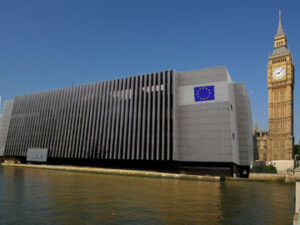Responding to claims by Britain Stronger in Europe that leaving the EU would harm the environment, George Eustice MP, Minister for the Marine Environment said:
‘Since the Lisbon Treaty the EU has systematically undermined the UK’s place on international wildlife conventions. We have already been stripped of our voting rights on Regional Fisheries Management Organisations and, extraordinarily, it is now unlawful for the UK to speak at wildlife conventions like CITES without first getting permission for what we want to say from the European Commission.
‘If we vote to leave and take control, the UK would regain its own seat and its voice in vital international wildlife conventions and everything from promoting shark conservation to ending whaling would become much easier.’
Also commenting, Gisela Stuart MP, Chair of Vote Leave said:
‘Pro-EU campaigners are descending into absurdity. It seems there is no good in the world that they cannot somehow attribute to the EU and no imagined disaster they cannot predict if we Vote Leave. In reality, if we Vote Leave on 23 June we can reclaim our voice at international institutions and spend the £350 million we hand to Brussels every week on our priorities likes the environment.’
The EU is bad for the green economy, with the European Court recently requiring the UK to raise taxation on energy saving products.
Because of a European Court ruling in June 2015, stating that the UK’s 5% rate of VAT on the installation of all energy saving materials was contrary to EU law, VAT will have to rise to 20% instead of 5%. The reduced rate of 5% on other products, such as insulation, heat pumps and central heating systems, will cease to apply to persons who are not (a) over 60, (b) in receipt of benefits, or (c) living in social housing. The cost of installing solar panels for consumers could increase by £1,000.
The UK must comply with this judgement, even if it means overruling the VAT lock, or face fines from the European Court.
The EU has threatened to sue Britain for trying to protect wildlife. We cannot ban the export of live animals for slaughter in the EU.
In 2009, the UK was reported to have voted against a common EU position to abstain on banning the international trade in bluefin tuna, in a secret ballot in the Convention on International Trade in Endangered Species. The Commission reportedly considered launching legal proceedings against the UK as a result.
The Government has admitted that a prohibition on the export of live animals for slaughter is inconsistent with EU law.
The EU has failed to keep the air clean. Its Emissions Trading Scheme has been labelled a an abject failure by Friends of the Earth and has proven a vehicle for defrauding of taxpayers.
Friends of the Earth labelled the EU’s emissions trading scheme ‘an abject failure’.
Between June 2008 and December 2009, fraudsters made €5 billion out of the ETS by exploiting single market rules, in what is known as a ‘carousel fraud’. HMRC accepts that VAT fraud ‘exploits the Single Market rules that were introduced in 1992′.
As recently as July 2015, the EU’s own auditors concluded that: ‘The ETS market remains at risk to VAT fraud‘.
EU policies have simply led to ‘carbon leakage’. This does nothing to improve the environment.
The European Commission has admitted that their policies have led to ‘Carbon leakage’ – firms leaving Europe and carrying on polluting in other countries. A report produced for the Commission in 2013 acknowledged that ‘Energy discussions play a major role in the overall situation for industry and are always on the background of carbon leakage discussions. Be it cheap shale gas in the US and Middle East or subsidised coal in China, the impact of energy prices is real’.
Leaving the EU will not damage environmental investment, which could be increased if we Vote Leave.
In 2014, the UK paid £19.1 billion into the EU budget, over £350 million per week. Investment within the environment sector in Britain would thus increase if we Vote to Leave.
EU rules have stopped Britain building the homes it needs.
The Government has acknowledged that ‘EU rules such as the Habitats Directive and wider EU environmental permit requirements’ are regulations which stop housebuilders ‘building the homes that Britain needs’.
The Home Builders Federation has said that the implementation of the Habitats Directive ‘brought house building activity to a virtual halt in large parts of some 11 local authorities in Berkshire, Surrey and NE Hampshire’ ten years ago, ‘leading to significant job losses in the home building industry and threatening the existence of many SME companies in the region’.
The Environment Secretary has previously criticised damaging EU rules which remain unchanged.
In January, Ms Truss said: ‘I am fighting for reforms like getting rid of the three-crop rule, reforming the over-the-top audit and controls regime, and the absurd requirement for farmers to put up ugly posters in the countryside to publicise EU funding‘.
Ms Truss has also accepted ‘there are serious costs‘ to membership of the EU’s single market. None of these matters were changed during the renegotiation.







